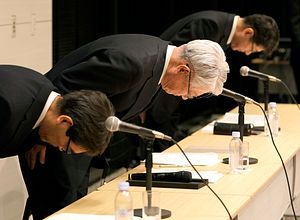Global metal exporter Kobe Steel is under police investigation and could face criminal charges for fraudulent data and misrepresenting the quality of its steel products. Authorities believe over the course of 13 years, Kobe Steel executives systematically cheated in order to gain an upper hand over competitors.
The Metropolitan Police Department and the Public Prosecutor’s Office have launched a joint probe to clarify the facts behind the data tampering under the Unfair Competition Prevention Act. Last week Japan’s third largest steel maker apologized for “causing trouble” and has pledged to cooperate with authorities in uncovering the extent to the flawed data that falsely certified the strength and durability of iron, copper, and aluminium products.
In October 2017, Kobe Steel held a press conference and first confessed to inconsistencies in quality control. An internal probe outlined a company practice where at least 40 employees at headquarters, some who moved up to senior board positions, oversaw the smudging of details to ensure products matched suppliers needs. Senior employees speculate data falsification dates back as far as the 1970s and somehow avoided detection. However, the investigation will only focus on breaches beginning after 2013.
The discovery first came to light in June 2016 after repeated quality testing at 23 factory locations could not replicate the quality standards requested by customers. Pressure to meet delivery deadlines and production goals were cited as the cause behind the irregularities. But a Kobe Steel source revealed pressure to raise profitability over the years unsuccessfully also played a role in the companies undoing.
The police investigation follows a Kobe Steel internal probe, an external committee investigation and government on site inspections. A chain of misconduct deepens with new suspected cases of fraudulent labeling being uncovered, topping initial estimates of 525 cases to over 600 cases.
Falsified materials were supplied domestically and internationally to build airplanes, bullet trains, cars, spacecraft and defense equipment. The scandal initially sparked a chain reaction of safety concerns from General Motors, Boeing, Honda and Toyota but 90 percent of misrepresented products cleared safety checks.
Although Kobe Steel’s former CEO acknowledged the company’s credibility had fallen to “zero,” after three years in the red, last week Kobe Steel recorded higher than expected profits of $578 million. However, the impact of the police probe was not included in the end of year fiscal report which concluded on March 31.
For two years running Kobe Steel’s Japan Industrial Standards certified seal has been revoked on stainless steel and more recently copper products. It’s a heavy blow to customer relations as the issue of compliance plagues Japan’s industrial sector. “Made in Japan” was once synonymous with the idea that the Japanese make higher quality goods. But its brand image is running out of steam following a chain of data falsification scandals which have embroiled Nissan, Mitsubishi, Subaru and Toray Industries.
The Kobe Steel scandal caught the attention of the U.S. Department of Justice in 2017 who warned of sanctions unless documents related to the data scandal were submitted. Meanwhile, a class action civil lawsuit for compensation has also been filed against Kobe Steel for an undisclosed amount further tarnishing Japan’s global image as a source of high quality craftsmanship.
In an effort to regain public trust, the government is cracking down on manufacturing companies that fail to meet industrial standards enshrined in law. Late last year, The Minister for Economy, Trade, and Industry announced plans to jack up the penalty for serious industrial standards breaches 100 times the current amount. The maximum penalty was one million yen ($9,000) and a one year jail term but it’s set to be raised to 100 million yen ($911,000).
In March, CEO Hiroya Kawasaki stepped down and was replaced by Vice President Mitsugu Yamaguchi, who vowed to perform fundamental reforms in addition to reviewing the management culture once the police investigation is completed.

































